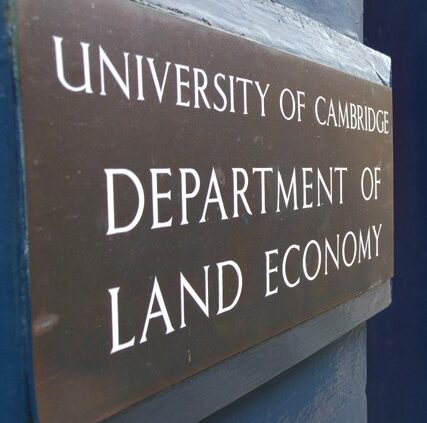Studying Land Economy at Cambridge
- UCAS Code: KL41
- How many are admitted to Cambridge every year: 71
- Typical offer: A*AA at A Level or 41-42 points in IB with 776 at Higher Level
- Essential subjects: None
- Useful subjects: Economics, Mathematics, and any essay-based subjects
A Land Economy undergraduate degree provides an opportunity to learn about a range of societal and environmental issues through an interdisciplinary lens. The course incorporates elements of law, planning and economics, as well as other disciplines, and enables students to identify how a range of factors shape the built and natural environments.
Students of Land Economy at the University of Cambridge will attend lectures as well as small group supervisions across each of their papers, which provide an opportunity to discuss key topics in depth. The course is taught by lecturers and supervisors whose specialisms lie across the breadth of interdisciplinary subjects covered in the degree course, and whose research contributes to cutting-edge global debates.
Land Economy graduates pursue a wide range of careers following the completion of their degree, including careers in law, economics, business, finance, the civil service, and research.
What can I do with a degree in Land Economy?
Graduates in Land Economy go into a range of sectors upon successful completion of their studies. The most popular sectors are banking and finance, property and real estate, and consultancy. The interdisciplinary nature of the course means that graduates are able to pursue many different specialisms across the private and public sectors, and leave Cambridge with an excellent set of skills which are valued by employers. Many students also progress to further study.
For more information, please visit the University Careers Service website.

Studying Land Economy at St Edmund’s College
Land Economy lectures are organised within the department, with St Edmund’s students learning alongside their peers from other Cambridge colleges. The department also organises several small-group supervisions for students each term. St Edmund’s Land Economy students will meet with their Director of Studies twice per term to discuss their studies and reflect upon their progress in a supportive environment. St Edmund’s has a growing number of Land Economy students, and new students will join a welcoming community for their studies.
How to Apply
Applications for all courses are made through UCAS. You must apply by 15 October 2025 to be considered for entry in October 2026.
We accept applications for Land Economy in both the October application round and the January application round. The January application round is specifically for candidates applying for certain subjects at the three mature Colleges at Cambridge (Hughes Hall, Wolfson, and St Edmund’s). The January round is particularly suited to those applicants taking one-year courses who may not have covered enough of the course content to apply in October, but are able to make a competitive application by January. The deadline for applications is 14 January 2026 for 2026 entry.
Entry requirements
Assessment
Written work
Interviews
Deferred applicants
Affiliated students
What is a typical Term’s work?
As they progress through their degree, Land Economy undergraduates are able to choose papers which match their interests. For the first year, all Land Economy students take the same four papers, which provide an excellent basis for further learning in subsequent years. These four papers are focused on the key disciplines in the Land Economy course. Students will learn about economics, law, and a range of quantitative and legal methods, and will be introduced to interdisciplinary approaches to understanding development and sustainability. Information on these modules is available on the Land Economy website.
In a typical term in the first year, students will attend weekly lectures for each of their papers, as well as several small group supervisions for each paper. Students will often be given an assignment to complete in advance of their supervisions. In addition to attending these sessions, undergraduates are expected to read extensively for their degree, and will be provided with reading lists of suggested literature for their course.


